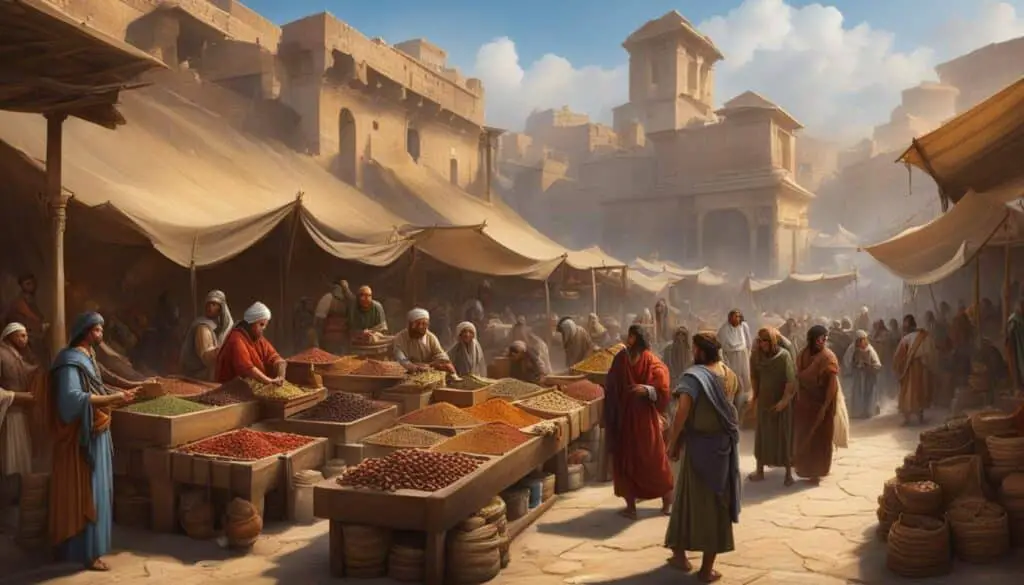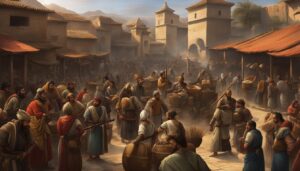
Trade and commerce in the Biblical world were integral components of ancient societies, shaping their economic activities and societal structures. The exploration of ancient trading practices and the biblical economy provides valuable insights into the historical context of trade during biblical times.
Examining the book “Wisdom-Based Business” by Hannah J. Stolze, we gain a deeper understanding of the significance of biblical wisdom in modern business practices. Stolze’s model emphasizes the importance of kingdom impact and challenges traditional views of business purpose. By integrating biblical wisdom into their operations, organizations can achieve redemptive goals and make a meaningful impact.
Key Takeaways:
- Ancient trade in the Biblical world played a significant role in shaping economic activities.
- Biblical wisdom is crucial for modern business practices and achieving kingdom impact.
- Stolze’s model of business includes servant leadership and other building blocks for kingdom impact.
- Proverbs 31 provides a framework for understanding biblical principles in business.
- Integrating biblical wisdom into business practices can guide organizations to have a meaningful impact on the kingdom.
Ancient Trade Routes and Networks in the Biblical Era
The Bible provides valuable insights into the ancient trade routes and networks that existed during biblical times. These trade routes were vital for the exchange of goods and ideas, connecting different regions and civilizations.
One of the most well-known trade routes in the biblical era was the Silk Road. This extensive network of routes connected the East and the West, facilitating the trade of silk, spices, and other luxury goods. The biblical narrative mentions the Silk Road in relation to the story of Joseph, who was sold by his brothers to a caravan traveling on this route.
The biblical era also saw the rise of maritime trade routes, especially in the Mediterranean region. The Phoenicians, known for their seafaring skills, established a vast network of trade routes across the Mediterranean Sea, trading goods such as timber, textiles, and precious metals. This maritime trade played a significant role in the economic prosperity of ancient civilizations.

Table: Major Trade Routes in the Biblical Era
| Trade Route | Main Connections | Goods Traded |
|---|---|---|
| Silk Road | China, Central Asia, and the Mediterranean | Silk, spices, precious metals |
| Phoenician Trade Routes | Mediterranean region | Timber, textiles, precious metals |
| Incense Route | Arabian Peninsula, Egypt, and the Mediterranean | Incense, spices |
These trade routes not only facilitated economic exchange but also played a crucial role in cultural diffusion and the spread of ideas. They allowed different civilizations to connect and interact, leading to the exchange of knowledge, technology, and religious beliefs.
The Impact of Trade and Commerce on Biblical Society
Trade and commerce played a pivotal role in shaping the ancient biblical society, influencing both its economy and social structure. The economic activities during biblical times were vibrant, with bustling marketplaces serving as hubs for commercial transactions. These marketplaces not only met the material needs of individuals and communities but also fostered cultural exchange and interaction.
The biblical marketplace was a melting pot of different backgrounds, where people from various walks of life came together to engage in trade. This vibrant economic ecosystem gave rise to occupations such as merchants, craftsmen, and traders, all contributing to the prosperity of the society. The exchange of goods and services in the biblical marketplace laid the foundation for the growth and stability of biblical civilizations.
Moreover, the economic prosperity resulting from trade and commerce led to the development of urban centers. Thriving cities emerged as a result, creating a socio-economic landscape that shaped the biblical world. The biblical marketplace was not merely a place for economic transactions, but also a space for social and religious exchanges, enhancing the overall prosperity and cultural richness of biblical societies.
FAQ
How did trade and commerce play a role in the Biblical world?
Trade and commerce were significant in shaping the economic activities of ancient societies in the Biblical world. They contributed to the development of prosperous cities and kingdoms.
Are there any historical accounts that provide insights into ancient trade routes and networks?
Yes, the Bible contains historical accounts that give us valuable insights into ancient trade routes and networks. Archaeological evidence has also confirmed the accuracy of these narratives.
What kind of goods were exchanged in the biblical era?
In the biblical era, goods such as spices, textiles, metals, and agricultural products were exchanged through the trade routes.
How did trade influence biblical society?
Trade and commerce not only provided for the material needs of individuals and communities but also fostered cultural exchange and interaction. The biblical marketplace served as a hub for economic, social, and religious exchanges.
Who were the key figures involved in trade during biblical times?
Well-known biblical figures such as Abraham and Solomon were involved in trade and amassed wealth through commerce.
What occupations emerged as a result of trade and commerce in the biblical era?
Various occupations, such as merchants, craftsmen, and traders, emerged as a result of trade, creating a complex economic ecosystem.
Source Links
- https://christianscholars.com/wisdom-based-business-applying-biblical-principles-and-evidence-based-research-for-a-purposeful-and-profitable-business/
- https://www.icr.org/biblical-record
- https://catalog.cairn.edu/content.php?catoid=17&catoid=17&navoid=361&filter[27]=-1&filter[29]=&filter[course_type]=-1&filter[keyword]=&filter[32]=1&filter[cpage]=1&filter[exact_match]=&filter[item_type]=3&filter[only_active]=1&filter[3]=1&expand=1&print








